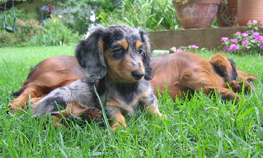
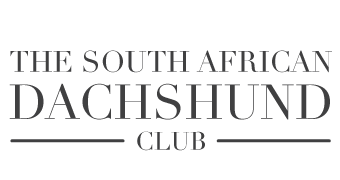

Nutrition
The acquisition of a puppy is often the reason for joining the Club and we frequently receive enquiries from anxious new owners about how to proceed with the nutrition of their puppy from where the breeder left off. It is not always easy to give advice, as the breeder is often not known to the Club and the feeding history of the pup therefore difficult to trace.When a puppy is bought from a reputable breeder, the new owner is usually issued with a "diet sheet" which should, in essence, be followed for the first year of a puppy’s life. Certain adjustments may, however, need to be made by the new owner. As the puppy grows older, he may develop an allergic reaction to certain foods on the diet sheet or show a particular dislike for them. To avoid obesity in a puppy with a particularly ferocious appetite, quantities may have to be cut or certain foods eliminated. The diet sheet is nevertheless a valuable guide insofar as it is an extension of the puppy’s eating routine up to the point of leaving the breeder’s home.
Not all puppies, alas, come into our lives via reputable breeders and many new owners find themselves in the unenviable position where they had not been given a diet sheet and consequently have no idea of how to meet the nutritional requirements of their puppy. The questions are essentially the same: How often must the puppy be fed? – and in what quantity? Is commercial dog food sufficiently nutritious, or should special food be prepared? As you will never find two breeders sharing the same view on puppy nutrition, we shall not attempt to provide a diet sheet. We do, however, feel that some general and time-honoured directives on nutrition could be of value to the "novice" puppy owner. These could be experimented with until a diet is found which agrees with the pup.
When a puppy leaves the breeder (usually between eight to twelve weeks of age), it should be eating at least three meals per day. At that stage most breeders seem to be feeding a Stage 2 or 3 baby cereal with milk in the morning, scrambled egg with lean minced beef in the afternoon, and lean minced beef or chopped chicken minced with cooked, pulped vegetables and rice (or pasta) in the evening. In addition to the three basic meals, a bed-time snack is recommended. This will ensure that the puppy sleeps soundly for most of the night. For the late night snack the cereal with milk may be repeated, or some puppy chunks, soaked in milk, may be given.
Some breeders are in favour of a mid-morning and mid-afternoon milk drink, but this will depend on the puppy’s tolerance for dairy products. First try milk slightly diluted with water and, if this has no adverse effect, then full cream milk can be introduced. If the puppy’s weight gain is not satisfactory, egg yolk should be added (one yolk beaten up in half a litre of milk and kept in the refrigerator). Always take the chill off the milk before giving it to the puppy and only heat up sufficient to serve at that particular meal.
Try to make the meals varied and interesting by adding a little stock or gravy. A few drops of cod liver oil on one of the meals is a useful supplement for puppies as it contains Vitamins A and D, necessary for growth, in fairly high concentration. It is also advisable to add a calcium supplement (obtainable in powdered or granulated form) to one of the meals. Follow the manufacturer’s directions carefully as far as quantity is concerned.
A puppy, and yes, also a Dachshund puppy, should be plump. Only cut quantities if the weight gain is excessive, but preferably do not eliminate on the meals altogether before it is time to do so. By the time the puppy is 16 weeks old, you will probably find that it starts picking at a certain meal (often the late night snack), or does not finish a milk drink. Eliminate this meal or drink and resort to feeding the evening meal a little later. Continue with the three basic meals for the next few weeks until the pup starts losing interest in one. Reduce and finally eliminate the meal so that at age six months two basic substantial meals remain. If the milk drink is still enjoyed, give it by all means.
The pup should have two meals a day until it is at least a year old and thereafter one meal may be dropped, but only if you are satisfied that one remaining meal a day will provide sufficient nourishment. The adult Dachshund should be well covered and be neither too thin nor too fat. Supplement the diet if the weight drops to an unacceptable level and substitute some of the bulk in the diet with digestive bran if weight has to be reduced. Never deprive the dog of a meal as a means to counter obesity. Weight should be taken off gradually.
A few points of advice
Never give a dog chicken or chop bones. The only bones suitable for a dog are marrow bones and these should be given regularly. Bones are essential for de-scaling teeth.
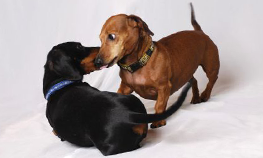
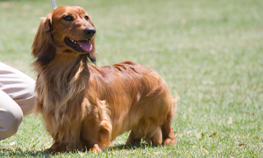
Photo: Sonelle
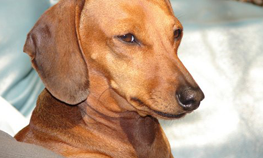
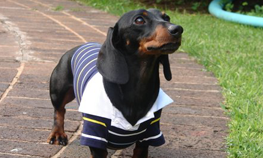
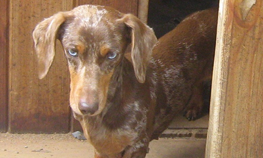
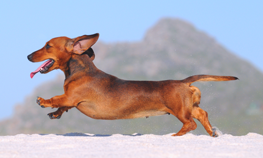
Photo: Johann Theron / Animaltalk
